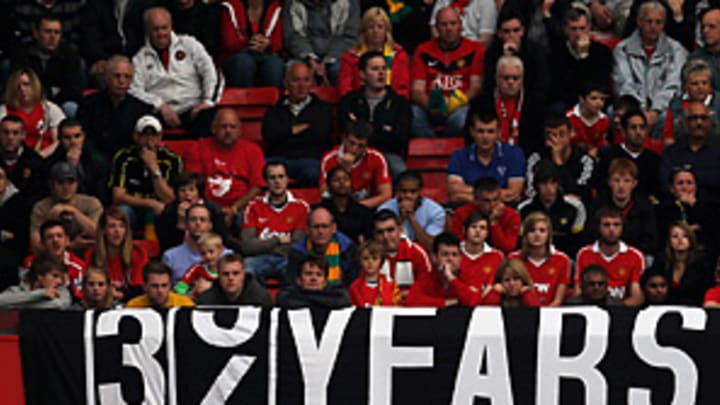When taunting by fans goes too far

Liverpool's recent clash with Manchester United was marred by arrests, ejections and, according to numerous reports, the repeated airing of a number of delightful ditties about the Hillsborough disaster of 1989 (when 96 soccer fans were killed in a stadium-related accident). The twist? This was an FA Youth Cup tie, played out in front of just 10,000 fans, including many young families who had snapped up the rare chance of a cheap seat at Anfield. It must be an unenviable task for any parent to address their children's concerns about the traveling support and that chorus of, "you killed your own fans." Likewise, no one wants to have to recount the tragic Munich air disaster story in order to explain the all too regular images of grown men pretending to be airplanes and laughing about people "dying in the snow."
The curious thing about these chants is that, though they can be heard quite easily in the stadium and on television, finding anyone who will admit to voicing them can be a far harder task. That's not the case, however, with the chants about the Heysel disaster, also heard at Anfield on Sunday. Though the majority of Manchester United fans I spoke to were appalled, several contacted me to defend their actions. In 1985, 39 Italian soccer fans were killed at the Heysel Stadium in Belgium after Liverpool supporters rioted and a wall collapsed. To mark the memory of that tragedy, Liverpool's, "We've won it five times," jingle has been refitted and rereleased with the lines, "We've won it three times, without killing anyone, we've won it three times." This is sung with great gusto and punctuated by the occasional shout of, "Murderers!"
The justification for these chants, Hillsborough, Heysel or Munich, is always the same. "They started it." Manchester United fans are subjected to those gruesome Munich taunts at almost every stadium they visit, as if the crash was a cup win to be celebrated and not the tragic demise of a group of young men who just wanted to go home. Leeds United fans have been accused of singing it more than most, though they complain about the chants of "Istanbul," a reference to two Leeds supporters who were murdered there in 2000. Munich songs were heard from the Arsenal end last weekend, but there are Gunners' fans who will argue that it was provoked by the home support and United fans' sickening "paedophile" songs about Arsene Wenger. No one really knows who started it now. Or even what "it" ever was. Sickness begets sickness, hate begets hate. Except that, apparently, there are varying levels.
"Confronting Liverpool with what they did isn't sick," argued one. "Twenty years went by and they didn't apologize. Singing 'murderers' is not like singing about Hillsborough. It's confronting a club with their disgusting behavior."
That might stand up if Liverpool FC was a homogeneous lump of aging Scouse hooligan, trapped forever in time, as opposed to, say, a quarter-full stadium of people of differing backgrounds and experiences, hardly any of whom were at Heysel or probably weren't even born in 1985.
"There's a world of difference between Munich and Heysel," insisted another United supporter. "One's an accident and the other is an act of hooliganism."
The flaw in this argument, leaving aside distracting dissections of what happened in Belgium, is that for many, the issue isn't about how people died, it's how their deaths are used. As a salutary warning for future generations of soccer supporters, a benevolent defense of Italian honor or just a quick, morally icky method of scoring points over rival fans?
There are many ways to successfully mock Liverpool and Manchester United supporters. The perceived loyalties and current form of Steven Gerrard and Wayne Rooney might be a good place to start. Why move straight to the morbid? What's even more depressing is that both sets of fans, and indeed fans of all clubs, are capable of great acts of compassion. The minute's silence, immaculately observed on the 50th anniversary of the Munch disaster was a glorious moment in soccer's history. The delegation of United fans who visited Anfield in the immediate aftermath of Hillsborough left their tributes with a quiet nobility that epitomized all that is good about their club.
The moment that the death of an innocent is used to score points is the moment when soccer ceases to be a game and morphs into something far more sinister. Whether the fallen have slipped their mortal coil or been pushed, surely they deserve more respect than to be used as crude weapons in a war that was not of their making? A Manchester United spokesperson was quick to describe Sunday's taunts as "disgraceful," but for some supporters, it's simply fair game. The Liverpool supporters, caught on television earlier this year howling "Munich" from the stands, have a similar theory.
Perhaps the final word should go to a Juventus supporter, given that it is that club's honor which is supposedly being defended in these perpetual slanging matches.
"Juventus fans have a checkered past of their own when it comes to sickening chants, having mocked city rivals Torino after their 1949 plane crash with airplane actions very similar to the Munich taunts. However, following Heysel both sets of supporters gradually stopped and the two clubs grew much closer. The Manchester United chanting is understood, but most believe their fans should do as Juventus and Torino have done. They should just leave it alone."
Iain Macintosh is the UK Football Correspondent for The New Paper in Singapore and the author of Football Fables. You can follow him on Twitter (@iainmacintosh).
